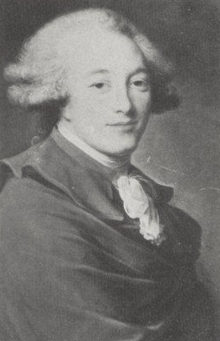Joseph-Alexandre Pierre de Ségur, Viscount of Ségur
Joseph Alexandre Pierre, vicomte de Ségur (14 April 1756 - 27 July 1805) was a French poet, songwriter and playwright.

Life
He was born in Paris, as the son of Philippe Henri de Ségur, Marquis of Ségur and Louise Anne Madeleine de Vernon. In reality, he was the son of the best friend of his father, Pierre Victor, baron de Besenval de Brünstatt, who acquired a certain notoriety under the French Revolution. He was Colonel of the Regiments of Noailles and Lorraine, and of the Dragoons of Ségur during the Ancien Régime.
Licentious by vocation, the vicomte de Ségue spent his existence composing poems, songs and comedies. In a way of perpetuating the tradition instituted by his birth, he had himself many adulterine children, to whom he gave his name and whose education he financed.
He made build to host his mistress Louise Julie Careau a house at the rue Chantereine, by the architect Perrard de Montreuil, a house that later hosted the loves of Joséphine and Bonaparte and became known as "Maison du 18 brumaire". He had two sons from her, Alexandre-Philippe de Ségur (1781 - 10 February 1803), unmarried and without issue, and Alexandre, vicomte de Ségur (1793 - 28 April 1864), who married Caroline Mathieu de Mauvières (- Paris, 1855), and had one daughter, Marie-Renée Claude de Ségur (12 February 1824 - 1 November 1903), who married Auguste de Gramont, duc de Lesparre (1 July 1820 - 4 September 1877), and had three daughters.
In 1789 he was elected a Deputy for the Nobility of Paris for the Estates-General. He remained loyal to the King and the monarchy, but participated very little in the debates. In 1790, he retired from political life and occupied himself of literature, publishing dramas and comedies.
In 1793 he was imprisoned during The Terror in the sordid gaols of Saint-Lazare, as were André Chénier and other artists of the time. A small actor that he had well known, Charles de La Buissière, who managed to get himself employed at the bureau of the Committee for Public Health, destroyed his accusation file along with the ones of countless personalities of the parisian scene who owed him their lives.
From 1796 to the end of 1801, he participated in the activities of the singing society of the Diners du Vaudeville, where he figured as "Ségur jeune", along with his brother Louis-Philippe de Ségur, who figured there as "Ségur ainé".
The vicomte de Ségur was not, however, destined to survive long to the end of a century in which he was perfectly emblematic. He deceased at the age of 48 years, in the arms of Mademoiselle d'Avaux, his mistress after twelve years, while he was recovering from a chest illness at Bagnères-de-Bigorre. His last posthumous publication, the memories of the baron de Besenval, his putative father, provoked a scandal in the good society of the time.
References
External links
- His theatre plays and their performances in the site CÉSAR
- The tomb of Joseph-Alexandre de Ségur atTrébons (Hautes-Pyrénées)
- Textes en ligne: C'est le même, 1798, L'opéra comique, 1799, Le fou par amour, 1791, Le retour du mari, 1792, Les vieux fous, 1796.
Bibliography
- Gabriel de Broglie, Ségur sans cérémonie, 1757-1805 ou la Gaieté libertine, Paris, 1977
Sources
- (in French) Jean Tulard, Jean-François Fayard and Alfred Fierro, Histoire et dictionnaire de la Révolution française. 1789-1799, Robert Laffont, Bouquins collection, Paris, 1987 (ISBN 270282076X)